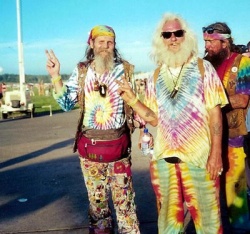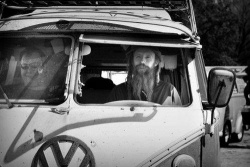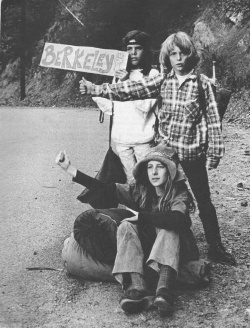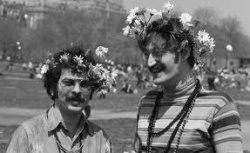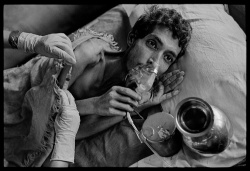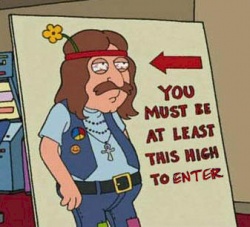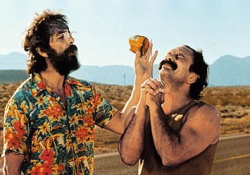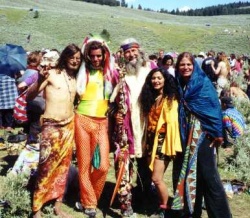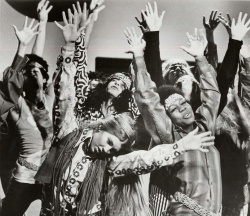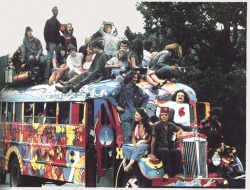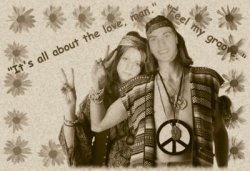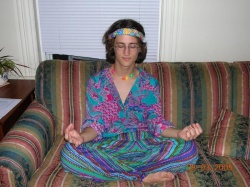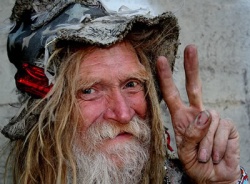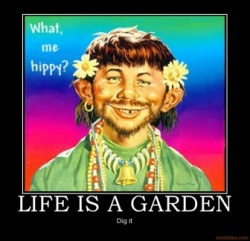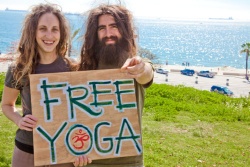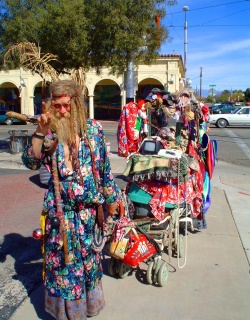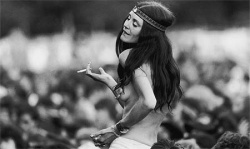Difference between revisions of "Welcome Hippies Through This Way"
m (Text replacement - "it may be" to "it may be") |
|||
| Line 317: | Line 317: | ||
Now in the plastic {{Wiki|society}}, the Pope's maiden {{Wiki|attendants}} increased one-fold, that is from 4 to 8. {{Wiki|Priests}} married, and legalization of [[homosexuality]] is asked for without [[shame]]. There is the same [[thirst]] in the plastic {{Wiki|society}}. How to find the [[purification]] for hippiedom through the plastic {{Wiki|society}}? When we take a trip to the hippie communities. we find that Hung-ups of the plastic {{Wiki|society}} come very often to indulge with small girls and {{Wiki|LSD}}. What is the differentiation between the Plastic {{Wiki|Society}} and Plastic hippiedom? | Now in the plastic {{Wiki|society}}, the Pope's maiden {{Wiki|attendants}} increased one-fold, that is from 4 to 8. {{Wiki|Priests}} married, and legalization of [[homosexuality]] is asked for without [[shame]]. There is the same [[thirst]] in the plastic {{Wiki|society}}. How to find the [[purification]] for hippiedom through the plastic {{Wiki|society}}? When we take a trip to the hippie communities. we find that Hung-ups of the plastic {{Wiki|society}} come very often to indulge with small girls and {{Wiki|LSD}}. What is the differentiation between the Plastic {{Wiki|Society}} and Plastic hippiedom? | ||
| − | All those hippies who have travelled in the {{Wiki|East}} and have been to {{Wiki|Darjeeling}} and {{Wiki|Kalimpong}} where many [[Nyingmapa]] [[Gurus]] are living, might have [[heard]] about [[Vajra]] [[love]], since | + | All those hippies who have travelled in the {{Wiki|East}} and have been to {{Wiki|Darjeeling}} and {{Wiki|Kalimpong}} where many [[Nyingmapa]] [[Gurus]] are living, might have [[heard]] about [[Vajra]] [[love]], since it may be taken into their account of practice. It should be a very good source to be turned on to with [[Wisdom]], [[Energy]], and [[Diligence]] by such hippies. |
First of all, the [[worldly]] [[desires]] for females should be [[purified]] through the [[visualization]] of nine stages of deterioration of corpses, until the [[practitioner]] sees every {{Wiki|female}} like a corpse or skeleton. He is then free from the lust-poison of females. | First of all, the [[worldly]] [[desires]] for females should be [[purified]] through the [[visualization]] of nine stages of deterioration of corpses, until the [[practitioner]] sees every {{Wiki|female}} like a corpse or skeleton. He is then free from the lust-poison of females. | ||
Latest revision as of 14:12, 30 December 2014
I. My Apology
Before being personally visited by many good hippies from various countries all over the world, my only connection with them was through reading newspapers and magazines which were publications of the Plastic Society. I had only had bad messages about hippiedom and thought of those hippies of the West the same as the Red Guards of the East.
Some newspaper reported that in Chinatown in San Francisco, California, there were Chinese hippie immigrants who lived on Jackson Street and opened an office of the Red Guards. After three months they did not pay their rent, they were driven away by the local police, and other Chinese immigrants in that town would not rent any house to them. They were working underground.
Again, I heard that in Nepal some western tourists of hippiedom purchased large quantities of the poison opium, with a value over seventy thousand rupees.
Many cases of abortion and suicide also were reported about in the hippie communities of New York and California. Marcy at 17 got turned on to drugs and lived from pad to pad, some 25 in all, in that same year developing an infection from an illegal abortion and visiting a hospital clinic irregularly.
James Groovy and Linda, his girl, were killed in a boiler room in New York's East village hippiedom. His friend Susie said, "Everyone is scared, every one carries weapons, even I carry a knife now."
They are treated as being filthy. In Haight-Ashbury, San Francisco, one resident claimed, "If some hippies moved next door to me I would move out, because I could not tolerate the filth." During these few years the hippies in the U.S.A. increased and crimes followed them. The F.B.I. reported that crimes rose twenty-one percent during the first six months of 1968, over the corresponding months in 1967. Armed robberies increased thirty-four percent during the same period. Violent crimes of murder, forcible rape and robbery increased twenty-one percent as a group.
Nevertheless, every group, party or religion has its corrupt members as well as its Sage or Saint. Why should the hippies be blamed alone. The members of hippiedom of those great countries of England, America, France, are speedily increasing. Among them a few corrupt members are surely found.
These hippies are not only those youths who have not been well-educated either at home or in school, that turn on to drugs, but also those learned persons such as athletes, politically orientated men of ambition, fraternity men, artists, aspiring nuclear scientists, even home economics majors, more or less use drugs. At Harvard an estimated 25 to 30 percent of the freshman class has experimented with drugs. At Princeton, 15 percent of the undergraduates have tried marijuana and about 20 percent of the students at Yale have used pot. The Dean of Columbia wouldn't be surprised if one-third of the students have played with it. It is said by Joseph Hoey that there are 300,000 narcotics users in the U.S.A. This is a large number!
Fundamentally, I am sorry to say, the West, unlike the East, has little, if any at all, home education. Parents hold a laissez-faire attitude. Let the children do as they please, with the pretext of freedom. First, they give their children a society where cheating, lying, and thievery are a way of life, without any shame. Second, their children break away from home where there is no love between parent and children. They learn only hate, jealousy, arguments, strife and finally divorce between mom and dad. Third, parental neglect is committed when the children grow up and their emotional problems arise. They are left without reasonable guidance and turn to bad friends. Fourth, children fall into the wonderful, wrathful fear of society of nuclear war and they begin to seek some way out or to escape from it. All this is the motive of the so-called drop-out. They have not religious renunciation at all. Fifth, when they pass college examinations they actually share the tensions of the men and officials. When they get their vacation from the University and stay at home they get no family consolation or family warmth. Besides finding some girl or taking LSD to get a state of temporary and false joy, they seem to have no way to go.
Thus the college or school education is also a cause which makes the youths form their hippiedom. Teachers and professors seem to treat education as a business of knowledge with nothing to do with the building of character.
Was Dr. William Herbert Perry (1859-1930) not an American educator? He gave a severe criticism of American education:
"Most Americans value education as a business asset, but not as the entrance into the joy of intellectual experience or acquaintance with the best that has been said and done in the past. They value it not as an experience but as a tool."
Emerson confessed that, "We are students of words. We are shut up in schools and colleges and recitation-rooms for ten or fifteen years and come out at last with a bag of wind, a memory of words and do not know a thing."
Even the facts about single things are unknown to Western youth much less about the relation between two things. Much less about the distinction between good and evil, merit and demerit, truth and falsity, real joy and temporal pleasure. I could not but admit that what has been called "the Satanic schools" is quite true.
Furthermore, "True education makes for inequality, the inequality of individuality, the inequality of success " as Felix E. Schelling insists. All schools or colleges work for the few students with the most talent, and leave all those whose abilities are mediocre. Even those who study diligently can not follow those very wise ones. Hence most students feel only hard pain and have no interest in study. They fall into examination tension and would like to escape from their colleges.
They treat their colleges as a prison or jail or even worse. George Bernard Shaw said, "There is no thing on earth intended for innocent people so horrible as a school. To begin with it is a prison. But it is in some respects more cruel than a prison. In a prison, for instance, you are not forced to read books written by the governors. In prison they may torture your body but they do not torture your brain."
We know that the foundation of every nation is based upon the education of its youth. Not only words must be taught but also inner conduct. Perfect behavior needs not only science but also morality. Nowadays under the flag of every nation, the schools are greater and larger than the churches. The teaching of goodness seems only to belong to the church and not to the school. This is not enough to make a good nation of good people. Youth has no chance to accept the training of good conduct if the saying by Fielding that "Public schools are the nurseries of vice and immorality" is true.
From the above analysis it would appear that each hippie has been driven out of his home and school by his parents and teachers. If there are some sins in hippies, they are caused by their parents and teachers and not by themselves. I do have pity for them for as Benjamin Disraeli said, "Youth of a nation are the trustees of posterity." From them we may foreknow what will be the destiny of a nation. From the hippies of many nations we may foreknow what the future of the world will be. We must guide them into a proper religion and proper practice and proper conduct with which they might be able to be masters of the whole world.
Every youth has the boldness to accept new things, has more urge to advance, more impetus to go ahead than to remain in the state of his parents. Francis Bacon said, "Young men are fitter to invent than to judge, fitter for execution than for counsel and fitter for new projects than for settled business." They are also educable and trainable, as is also said by the same author, "Young men in the conduct and management of actions embrace more than they can hold, stir more than they can control to the end without the consideration of the means."
Hence many youths have been utilized by Communist agitators. Many of them have been victims. Many corpses have floated down from the Great Land to Hong Kong, as we know from the newspapers. But they may also be guided by Buddhists if we, the old Buddhists, pay more attention to them and actually lead them in the Buddhist way. They are quite hopeful.
Now the youth are guided only by themselves and the result of this may be quite dangerous, just as Lord Chesterfield's saying, "The young leading the young is like the blind leading the blind, they will both fall into the ditch." They are apt to think themselves wise enough just as drunken men are apt to think themselves sober enough. As their heads are giddy and their hearts warm, their acts are bold and their blood hot so that ambitious men utilize youth to fight their enemies. Many youths often die for such people without any reason. Many political men have succeeded on a foundation of youthful corpses. What a great pity it is!
I myself am a Buddhist and wish to offer my suggestions to hippies. This may give a little help to their spiritual life and at least I can point out what the dangers are to them and help them avoid being utilized by immoral political persons.
Before I give some direct advice to hippies, I would like to say something concerning how to change the source from which hippies were produced.
- Parents should bear the moral responsibility to teach their children. Once I read an article written by a householder, a Mrs. Jean, on the subject of "How to get along with my husband." When her four children were gone, some to camp and others to friend's houses for the night, she was very happy to have only her husband with her. She never thought of what was being done by her children outside the home. Most parents in the West are like her. Hence children have become addicts or hippies. Parents do not know enough about them. Such neglect should be stopped.
- Teachers or professors who have become very modernized should not be engaged by schools and colleges. Those music teachers who advocate music like the Beatles, or those art teachers whose art is made like that of a mad man such as Marcel Duchamp who neglects the laws and regulations of art should not be hired. Students who daily hear such music and see such pictures must tend to become hippies.
- Priests and nuns who emphasize free love and ask for marriage should be driven away from the church.
- All those cinema and T.V. films which show how to be robbers, prostitutes, how to fight and how to quarrel, should be forbidden.
- Cigarettes, opium, and all exciting drugs should be forbidden. Not only LSD but also all kinds of smoking and drinking should be completely forbidden. Parents, teachers, professors and priests should forbid themselves to take such things. If the leaders show a good example, how can the followers do otherwise?
Now I should turn to the main subject. During these last few years, an increasing number of hippies have visited me from different countries throughout the whole world. Almost every week I have some new hippie visitors. The promotion of the hippie lifestyle is not by means of the propagation of a hippie philosophy or religion, which they lack, but by smuggling LSD into every country. I was told by a Western friend that 556 American hippies are being held on drug charges in thirty-seven foreign countries. Surely all those youth who take LSD are hippies. My visitors came from many countries: from New York, California, and Washington in the U.S.A., London, Australia, Scotland, Netherlands, Italy, Turkey, Belgium, West Germany, France, Sweden, Denmark, and Canada. Some hippies worked on a steamer until it docked in Calcutta and then left their jobs. Others came overland from Europe, some who are rich came by jet. I am very sorry that the place I chose for a hermitage which was originally peaceful, in 1962 became a military controlled area and foreigners can not get permission to stay a long time in Kalimpong. They come to me through many difficulties but are only able to meet me two or three times in one or two days. Besides this I am able to present them with some of my booklets, books, and images. I could not give lectures to them over a long period. What they needed was too much; what I offered was too little. I was so sad that I could not satisfy their thirst for the Dharma and I sent them farewell with tears.
When hippies first came to me, they hid their status as a hippie. But after I frankly told them that I loved hippies and had deep sympathy for them and also that I earnestly wanted to hear their experiences of their trips on LSD, then they frankly told me many wonderful things.
Some said they had an insight of the Buddha, some even pointed to a certain Buddha in my hermitage; one Canadian hippie said, "I had a vision of your whole hermitage and heard a heavenly voice which said "Mr. Chen." Afterwards he came across my booklets through a friend in the U.S. He then determined to come here.
Certainly, Buddha and demons both take advantage of the LSD function to appear in the hippie's vision. He who has good Karmas accumulated in past lives may see Buddha. Bad Karmas may cause Demons who may ask him to commit suicide and he may do so accordingly.
Hippies may be classified into seven kinds:
- 1. A new breed of hippie drug addicts.
- 2. Teenyboppers.
- 3. Severely emotionally disturbed people using hippiedom as a sanctuary.
- 4. Miscellany.
- 5. High priests who take Buddhism as their philosophy and when using drugs, follow the doctrine of "The Tibetan Book of the Dead" at the same time.
- 6. Philosophic hippies who widely study Yoga, Ch'an, Buddhism and Hinduism and who like to read Han-Shan's poems.
- 7. Novices who are youths following the older leaders as those in Nos. 5 and 6 above to practice Buddhism and travel to the East with a desire to meet a Guru.
Numbers 1 to 4 above are called Plastic hippies, totaling more than 50%. The priest and philosopher of Nos. 5 and 6 may be said to be very rare, like the stars in the morning. The last kind, novitiates may be estimated at 45%.
Most of my visitors belong to the 7th kind. A few visitors are of Nos. 5 and 6. It is a very good chance for me to communicate with them and promote the Dharma and to offer some philosophy or technique for their learning and practicing. I have already written some books and booklets on the subject, but to heal their habits and cure their mental sorrows, I have to know their characteristics, their thoughts and their emphasis. Thus I trusted a friend in California to send me some hippie books. She sent me more than ten hippie works from which I have come to understand hippies very clearly.
This booklet refers to many books on both sides, for and against hippies. It follows the three main emphasis: Drop Out, Turn On and Tune In, and offers some Buddhist theories and practices for the choice of hippies.
II. Drop Out
A term in Buddhism which might be synonymous with this phrase "drop out" is renunciation. I have often heard hippies praise sages of all religions for renunciation. St. Francis of [[Wikipedia:Christianity|Christianity]], Han-Shan of Buddhism, Milarepa of Tibetan Buddhism, all of them dropped out from their families, their society, and their church.
Indisputably, every religion begins with the practice of renunciation. Every sage was produced in solitude. Solitude is the soul's best friend but not that of the noisy plastic society. Solitude is the nurse of enthusiasm and enthusiasm is the true parent of genius. In all ages, solitude has been called for, has been flown to, as Isaac D. Israeli emphasized. Emerson also believed, "I am sure of this that by going much alone a man will get more of noble courage in thought and in words than from all the wisdom that is in the books". Hawthorne witnessed this point, "Living in solitude till the full of time I still keep the dew of my youth and the freshness of my heart."
I am very sorry to say that drop outs were very rare in ancient times but are considered very common in our Kali age--the Beat Generation. In our age there are so many attractions which lure people, both young and old, to fall into the ocean of desires. How is it possible for the youth to actually drop out?
In my works both in Chinese and English I emphasize renunciation. These works have been written not only with ink but with tears. Still I live here alone as a hermit, without any friends who would like to accompany me in doing practice. I always say, "Hard is this practice of renunciation." After I studied the hippie books, I began to see that their dropping out is quite different from that of the Ancients. They have long hair but it is not grown in solitude. They have long beards but it is not grown in a cave. They drop out from using a watch, but they are not living on mountains and they wander everywhere by train, taxi or jet which have certain times to start and arrive and so all of those hippies use the watches of others. But they still persist in keeping their long hair. A French hippie burned himself to death because his parents made him cut his hair.
Han-Shan had long hair because he lived on a mountain on which there was no barber. When I lived in a cave with no person around for 50 miles, my hair remained uncut for two years and became very long. Once a youth heard about me and earnestly came to my cave and called me. As I did not talk he asked me to write. He said, "Your hair has become too long. May I bring a barber from a nearby town to cut it?" I wrote "Yes!" The next dawn, before he arrived with the barber, his dead mother came flying through my window and asked me to transmit her consciousness to the Pureland. She also said, "My son will come to you soon: I died for him and now he has a little merit by bringing a barber for you!" Thereupon I did the transmission and her son came to me and my long hair was cut! Suppose I had refused his request, then his mother's transmission would not have happened. What is the use of keeping hair very long and leaving a soul in the ghost state.
In hippie communities all the rooms, the musical instruments, the food, the clothes and flowers are all obtained from the plastic society--even when they picnic everything is obtained from the plastic society. They wander from town to village and everywhere they may meet barbers. They have enough chance to meet and enough time to have their hair cut. They are not like Han-Shan living on a deep mountain and practicing the Dharma diligently. He had neither chance nor the time to cut his hair. That was why his hair was so long.
Hence any dropout must have a purpose. Try to reflect in yourself. Do you renounce for those who love you? Or for those who know you truly, or for the God who smiles above you, for the cause that lacks assistance, or for the wrong that need resistance. A man without purpose is soon down to zero. Your dropping out is abandonment of your parents, but you still take some of their possessions with you. You have left your school, but the words of hippies, the phrase "drop out" and all you emphasize, "high", "happiness", "freedom" always passes through your lips. Jesus dropped out and saved many souls, opened the eyes of the blind, enabled the dead to rise, fed many persons with only a little fish, could you do the same? Milarepa dropped out and saved many sentient beings of the six realms, could you do the same? You drop out from lawful marriage and its responsibilities, but pursue flower children and again drop out on those illegitimately born. Is this kind of drop-out not an evil or demerit?
The ancient dropouts were supported by poverty and with the purpose of getting more time to practice the Dharma. Below I introduce some methods of Buddhist dropouts.
1. Four kinds of dropping out: a) Dropout from one's native country, getting rid of the cause conditions of hindrance. b) Dropout from the surroundings of hate and lust, getting rid of the objective conditions of hindrance. c) Dropout from sorrow, getting rid of the increased conditions of hindrance. d) Dropout from evil friends, getting rid of the close conditions of hindrance.
2. Twelve Dhuta practices to dropout one's food and clothes and lodging gradually.
a) For food:
- 1) Take only begged food.
- 2) An early morning drink with only one meal taken before noon.
- 3) Take no food between these and at other times.
- 4) Only take a limited amount.
b) For clothes:
c) For lodging or shelter:
- 7) A hermit dwelling by oneself in a cave, forest, or solitary place.
- 8) Dwell only among tombs.
- 9) Live only at the root of a big tree.
- 10) Be an open air dweller with no protection from the elements.
- 11) Sleep in any offered place, not choosing for one's comfort.
- 12) With only space for sitting but not lying down for sleep.
These twelve Dhuta conducts were not only practiced by Hinayanists but also by Mahayanists.
3. For the purpose of practicing the Dharma, one drops out under the four dependencies as shown by my poem:
- Mind depends upon Dharma,
- Dharma depends upon poverty,
- Poverty depends upon death,
- Death depends upon solitude.
4. The ancient Ch'an School sages have set many good examples for us. a) The Rev. Ch'an monk Chin-Who wore only papermade cloth--even less than required in the Dhuta conducts. b) The Rev. Ch'an monk Hui-Man lived among graves. c) The Rev. Ch'an monk Jih-Fong ate the fruits of the wild and drank the water of the river and never cooked. d) The Rev. Ch'an monk Shuan-Tai dropped out even from his disciples. When he was going to his death, nobody was there to even start the fire for him. He therefore burnt himself and sang the following song. I translate it for you below:
- Without either a shave,
- Or washing in a wave,
- In the fire I burn myself.
- Enough, it is quite enough!
Most hippies like to read Han-Shan's poems, but those Western translators have not completely translated all of his poems and many fine ones have been left out. I will translate a few below:
1.
Alas! ill and poor man,
No friend, no kinsman,
No rice in the jar!
Dust is in the pan!
2. New corn is not yet out,
Old corn is all at nought,
I beg from rich men and wait,
Standing lonely outside their gate.
3.
Some person did advise me,
To accept a kind of fee!
To make good farm with walls.
Alas! I could not agree!
My dear hippies, if you really want to drop out for the purpose of practicing the Dharma, I do welcome you by this Buddhist way!
I hope all our young brothers and sisters do think of this matter and reflect upon it. When one has already dropped out, should he become attached again? Should he have no other purposes than dropping out? Should he not practice the Dharma in hopes of saving those who have not yet dropped out? To drop out is to get more time to practice the Dharma, time which is usually wasted in doing worldly things. To drop out is to leave the evil world which is attractive and lures every youth to fall. To drop out is to be alone, but not to gather another group to drop in. To drop out is to try to live with the highest spiritual persons such as Buddhas, Bodhisattvas and God and learn from them their supernatural powers with which to save others. This is the only and highest purpose for dropping out!
III. Turn On
Generally this term "turn on" means to set a person to do something; particularly in hippiedom it means to take drugs. Hung-up American people live in a plastic society surrounded by drugs. There are pills to pep them up, pills to calm them down, pills to wake them up, pills to put them to sleep, pills to gain weight, pills to reduce weight, pills to avoid conception, pills to increase fertility, pills to avoid pain, pills to extend sexual time.
That hippies use drugs is a fact which should come as no surprise. There are many kinds of hippie Drugs, viz., Hemp or Ganja, marijuana or grass, opium and opiates, Peyote or mescaline, psilocybin, hashish, etc. Lewin distinguishes kinds or classes of drugs that influence the mind and emotions, viz: eupharica, phantastica, inabriantia, hypnotica, and exitantia. LSD is a kind of phantastica of hallucinogens.
There are many derivative drugs from LSD by the use of substitute chemicals: S.T.P., methedrine, speed weed and beads, crystals and pistol speed whichever one prefers to call it. What does LSD mean? Many youths who have taken LSD for many trips are still unable to answer this question. I found the answer in a book named "The Private Sea: LSD and the Search for God" by William Braden. It is said "LSD is a synthetic drug: d-lysergic acid diethylamide tartrate, a compound from a constituent of a rye fungus known as ergot." "It was first synthesized in 1938 by Dr. Albert Hoffman, a biochemist of the Sandoz Pharmaceutical firm in Basel, Switzerland, but the scientist did not know what he had created until 1943 when he accidentally inhaled or otherwise absorbed a small amount of LSD and by this means discovered the drugs curious properties. It produced uncanny distortions of space and time and hallucinations that were weird beyond belief." It also produced a state of mind in which the objective world appeared to take on a new and different meaning.
LSD has another meaning which seems a joke. Found on a roadside wall in London were the crude letters "L.S.D. is GOD", as most hippies did see God in their insight after taking LSD. But another meaning has been suggested: "L" stands for pounds, "S" for shillings, and "D" for pence. The connotation is that money is God, which makes God too pragmatic. That God can be produced materially by a drug is a joke comparable to this pragmatism.
Two questions follow if LSD is the only thing with which to turn on with: One is whether LSD is or is not profitable to the human mind and life; the other is whether LSD is addicting or not. Many researchers either hippie-scientists or anti-hippie scientists, have made some theoretical studies and practical experiments. I have read over and cited some below from which conclusions can be drawn:
Through ironical fact, the answer to the first question is only negative: many dangerous experiences have been heard of and many terrifying mystical insights reported, and also many users have been taken to hospitals. The Los Angeles Police Department warns: "Epileptic seizures, panic, depression, hallucinations, anxiety, confusion, suicidal tendencies, successful suicides, prolonged psychosis and even homicide have been the products of LSD."
After taking the drug, the reactions of many users have been quite insane and instances such as the following are familiar to everybody.
1. One youth felt omnipotent and ran out on the Freeway to play with the toy cars and was killed. 2. One person slept on the floor because he thought his bed was only two inches long. 3. Another man felt he had to offer a human sacrifice and tried to throw his girl friend off a building. 4. One student after taking LSD broke his back.
A record from a hospital in New York State says: in the 114 LSD cases hospitalized in an average period of 18 months at Bellevue, the average age being 23 years, 13% entered the hospital with overwhelming panic. There was uncontrolled violence in 12%; nearly 9% had attempted suicide or homicide; one out of seven had to be sent from Bellevue for long-term mental hospitalization and half of those had no previous history of underlying psychiatric disorder.
A tape recording which contains hippies, personal confessions has also been edited and published by a very well known scientist under the title of "The Hippie Trip" in which we read the following:
1. A Jewish hippie, Mr. Bloom confessed, "I was going to be crazy or kill myself or kill somebody else." 2. There is an annotation that the body of a man was found dead in a sleeping bag on Sunday. 3. On the same page we learn of a hippieland drug pusher whose mutilated body was found in his apartment. They are murders by John Kent Carter. 4. On another page it states that a Mr. Shaw maybe got paranoid and hallucinated. He must have killed a guy and cut his arm off. He took the arm with him in a car and was arrested in Sebastopol.
When a mother takes LSD and leaves her children alone without any care, many things can happen, things which normally do not happen in the plastic society.
When the author Mr. Gerry was at Morning Star Ranch, he saw a child about four years old wandering aimlessly and crying loudly. He had one shoe and the other shoe was missing. No one seemed to be paying any attention to him. He appeared to be abandoned. The author went over and picked the baby up and hugged it. He then became aware that the baby smelled badly of urine and feces. The author said "I will never forget the child's simple words, 'I'm lonely'."
The author was also told by a young hippie about a child who was left alone when his mother took Acid. The boy was run over by a car, a dog bit him and he was taken by somebody to a hospital.
Some hippies have said it is joyful after taking LSD. Prof. Alan Watts wrote a book called "The Joyous Cosmology," but on page 76 he confessed that "Like too much alcohol, selfconsciousness makes us see ourselves double and we mistake the double image for two selves, mental and material, controlling and controlled, reflective and spontaneous. Thus instead of suffering, we suffer about suffering." Are these sufferings joyous?
He also confessed on page 31 that sounds are not only joyous; sometimes they may also be fearful. Do fearful sounds make us joyous?
Mr. Gerry is a leader of hippies and has been in jail at least twenty times. He confessed in a tape, "Maybe Acid is just a one-time or two-time thing so sometimes you know you use it and it does things for you or it does not and after that you just sort of get into a game with it."
Let us now leave those criticisms from individuals, police and newspapers, and listen to the opinion of researchers such as scientists and doctors who themselves have taken a few trips of LSD for a personal experience. They have made serious experiments and their reasonable advice should be reliable.
1. Dr. Cohen obtained a blood sample from a patient who had received fifteen LSD treatments for schizophrenia over a sixteen year period. Three times the usual proportion of broken chromosomes was found in his cells.
2. Dr. Samuel Irwin of the University of Oregon secured the help of Portland hippies who had used LSD several times. They agreed to donate blood for scientific inquiry. He also obtained nine samples from normal healthy non-LSD users and delivered all seventeen samples to a colleague. Dr. Jose Egozues, whose tests seemed to confirm the Buffalo findings of Dr. Cohen. He found a significant excess of broken chromosomes and other chromosome abnormalities in six of the eight LSD users, but none in the nine samples from non-LSD users.
3. At the University of Wisconsin, two researchers injected microscopic doses of LSD into pregnant mice on the seventh day after the mice were mated. The effect on the unborn mice growing in the uterus was severe. Abnormal brain formation was found in more than half the embryos. They also found abnormalities of the jaw, mislocation of the eyes, and bizarre facial contortions. Among 19 litters of mice, only one seemed normal.
4. A symposium of 26 professors and doctors from very well known universities, hospitals and institutes of America and other countries held a meeting where each presented his opinion and the results of his research. The professional people included people from all the well-known hospitals and research institutes in the U.S., and some of them were from England and the Netherlands.
Dr. Hartman of the California Psychiatric Institute said, "When I took the drug myself, I found that I was suffering from the delusion that I had been psychoanalyzed. I had spent seven and a half years on the couch and over 20,000 dollars and so I had been psychoanalyzed."
C. H. Van Rhiym of Netherland's Mental Hospital said, "Most of these patients produce a good deal of material, but which fail to integrate and the results are poor."
Dr. Cohen of the California Neuropsychiatric Hospital said, "Though we have been using the available measuring instruments, the check lists, the performance tests, the psychological batteries and so forth, the core of LSD situations remain dark, quite untouched by activities."
A chairman of the meeting concluded that there are many different basic assumptions held by us, "but that no determination to say that LSD is necessary to any religious person, youth or patient."
In other reports from these scientists, there were likewise no good results of LSD mentioned. Chromosome damage was also indicated by the National Institute of Mental Health. This institute held a meeting in Washington D.C. in the fall of 1967 attended by many of the researchers cited in the summary of research into chromosome damage and by other nationally known scientific figures doing research in this area. Could there be any more reliable researchers able to get results other than those mentioned above?
In regard to the question of whether LSD is or is not addicting, some said, "It has not certainty; quite a number of elderly patients who responded well relapsed when the drug was withdrawn within a six month period. It seems that in some cases patients may have to be on this drug almost indefinitely. One patient, a thirty-five year old paranoid schizophrenic was maintained on chloropromazine for over a year and every attempt to drop the dosage was attended with relapse." Another said, "It is very well-known that drug addiction is very high among hippies. The use of drugs by hippies is just about as common as bathing is among ordinary people. The horrible effects of drug addiction can hardly be over-estimated. The main bad effect of drug addiction is that it twists the minds of the misguided users. Some of their minds have been damaged so much by drugs that they are doomed to remain abnormal. Some are driven to commit suicide; others, under the influence of drugs, have been driven to some crazy action which resulted in their premature death."
Dr. Smith who is the founder of the Haight-Ashbury Free Medical Clinic said, "If you take it too regularly, even though you really aren't addicted, you develop a heavy tolerance. So you would have to take a progressively higher drug dosage to achieve the same effect."
In my humble opinion, the difference between addiction and non-addiction is only in degree but not in quality. Does writing a composition or poem lead to addiction? No! But I have met such addicts in my country in Hunan. One was my friend Mr. Lui who was secretary of the government of Hunan Province. When he wanted to write a composition he immersed himself in the subject completely, at all times, both day and night. He paid attention to no other activities of his daily life. When he ate he could only take from the dish that was nearest his seat. When he wanted to go out on a rainy day, he sometimes changed his shoes only for the right foot and not the left. When he went to a dinner party where every visitor's hat and robe was taken off and hung on the wall, after dinner he usually took another's hat and coat by mistake. When someone asked him a question, he could not answer it immediately. He was thinking of his composition with complete concentration. He seemed always like a mad person. Could he not be considered an addict of composition?
Another person was a friend of mine and a Bhikshu. He liked to write poems. He used to lie down on a chair to think of a poem. He could not sleep if the poem was not well-formed in his mind. He could not eat without thinking of a poem at the same time. So his digestion became bad. He got consumption and died from this disease. Is this not a case of addiction to poems?
Charles Reade (1814-1884) said, "Sow an act and you reap a habit; sow a habit and you reap a character; sow a character and you reap a destiny." In line with this same formula, may I suggest this: "When one trip is taken, many trips will follow, and the result is addiction without question."
Now let us approach the following sphere of discussion: Is LSD any help to the religious person?
We know there are seven classes of hippies as I have mentioned before. Plastic hippies account for more than half of these seven classes of hippies. The priests and philosophers are very rare like the stars in the morning. We may estimate the Novitiates at approximately 45%. Most of my visitors belong to the last three classes.
To such a religious seeker does LSD have any purposeful function and may it be useful or harmful to their quest? The hippie books usually mistakenly conclude that drugs were used by Eastern religions. But many modern Hindus do not agree with this. In the book : "The Drug Experience" on page 109 it is written "When Sri Anandamai was asked, she said, "The many Indian sages and aspirants used Bhang (a drug like hashish) in order to achieve a disassociation between the mind and the body but that it was highly dangerous. The only safe way was the traditional way of training both mind and body together, until the demands of the one upon the other became minimal." Sri Reshabhchand who is an Indian leader of a yogic center, wrote a booklet named "Religious Revival by Biochemical Means" in which he did not admit that any drug can help one to find the truth. On page 7 he said, "there is no possibility of any trip through some chemical door in the wall into that so-called world of transcendental experience."
I also had correspondence with Kaviraj Dr. Khazanchand who is a well-known Aryuvedic doctor. Once I specifically asked his opinion about LSD. His reply was as follows:
"In response to your esteemed letter of recent date, I am to state that LSD is narcotic in action and should not be used at all. Its users get addicted to it and it spoils life. It is injurious to the system."
In my humble opinion, the function of LSD for the religious person is that it may offer a means of experiencing God or Bodhisattvas or Buddhas, and give the users some realization upon which to base their belief in those beings. Yet this cannot always be done unless the users follow certain doctrines and methods of practice. In addition, sometimes the {{Wiki|psychophysical]] conditions produced through the action of LSD may help the users to open certain inner nerves or veins, in which there are situated the Gods and Buddhas who may appear when these nerves are opened. in the traditional way, these nerves and veins may be opened when Evolutional Yoga and Integrational Yoga are practiced through deep breathing and visualization and the profound Samadhi of Sunyata.
The following quotations and reasons may substantiate my opinion.
1. On page 4 of the book "The Private Sea: LSD and the Search for God" by Willie Braden, we find, "In short, they leave man pretty much on his own with nobody to turn to but himself, with no place to seek salvation except inwardly, in the recesses of his own inner being."
This brings a message to man that God is not only outside one's body, but also within. We should not treat the god who appears through the functioning of LSD as real, but we must encourage ourselves to discovr our inner God or Buddha through traditional Buddhist practice.
On page 219 of the book "The Hippie Trip" is written, "Basically man is God, and this is one of the profound insights that you can have on LSD. You experience yourself as God, you come back down here into this dismal state of reality. After being God on LSD you have seen it, you have experienced it. It is a true feeling; you know it's truth. So you cannot change them but you can change yourself, and you can become God-like and you can relate to people like a God or like a Christ, you can let the light shine as we try to achieve a New Community." But actually the feeling of God is not the real God, just like if one dreamt one was a God, but after one is awake, he might find out that he is not really a God.
In Buddhist Tantric practice when practicing the Evolutional Yoga, one visualizes oneself as a Buddha for a very long time, but he could not say he is a real Buddha unless and until his deep wisdom, great compassion, and supernatural powers are equal to the Buddha's. Hence drug induced experience does not turn one on to the real thing, but the course of Buddhism does.
2. Many users who have taken one or more LSD trips have experienced the unreality of the world and personally intuited that it is like Mayah may prove that the philosophy of Buddhism is true. On the contrary, when the Hindus say the world is created by Brahma and hence it might be real, this is a false doctrine. However, the real Nirvana is beyond the reach of Samsara and the transcendence of Samsara depends upon the practice of Buddhism but not on the continual use of LSD.
3. Some users felt no time limitation; many had the experience of time stopping or, in any case, ceasing to be important. That is why most hippies do not use watches. When they see someone wearing a watch, they might ask him what is the time with Homeric laughter. "To continually abide" in the time of no limitation is not so easy. One has to practice the Sunyata Samadhi until the real transcendence of time is attained.
4. Users may experience non-duality and the absence of distinctions such as sweet or sour, big or small, love or hate. All opposites are harmonized. There is a kind of Harmonization-Yoga in Mahamudra which should be practiced for a very long period; one may really get such a realization for forever, not just for a passing moment.
5. Professor Lewis Yablonsky wrote about his experiences in his "Voyage of LSD." He also felt omniscient and omnipotent. Yet such an evanescent feeling cannot compare with the assurance of true and confirmed realization.
6. A very rare experience is that, some users who were neither Buddhists nor Hindus, neither non-egoists nor egoists, said the same things from different mouths, that their ego was utterly lost. They personally tasted the happiness of non-egoism. This rare point is quite an important instruction to those Hindus to rid themselves of their Divine Self.
Rishabhchand who is a practicing Sadhu of a leading Hindu Yogic Center wrote a booklet concerning biochemical means and rejected them. But if one had already felt there was non-ego, either worldly or divine, how could you uproot this feeling from their minds?
7. Some users may see varieties of light, just as Prof. Alan Watts collected many kinds of light in his book "The Joyous Cosmology." These lights are not of the same nature as the Holy light of Buddhist realization. The plate of platinum crystal mentioned on page 71 of his book can be seen by any person by rubbing his eyes without taking LSD! All the other plates of light photos are of no particular aid to any kind of practice of any religion. The more you see such light, the more you are distracted by it. On earth we have some insects and animals that shine light, such as the firefly. In the sea, Noctiluca and Euphausides Lantern fish all shine their lights. According to Tantric philosophy, every vein or nerve may shine its light when it is excited or opened through wisdom breathing. Some light brings wisdom, while other light brings only ignorance and sorrow. Only when the medium nerve is fully opened does the light of the Dharmakaya appear like the autumn sky without clouds accompanied by the Sunyata.
He who takes LSD in quantity comparable to the Pacific Ocean for one myriad years without realizing the Samadhi of Sunyata, will he ever get it? Alan Watts who could not distinguish Christianity's light from the Buddhist light as his work "The Spirit of Zen" discloses, and which I pointed out in my work "Discrimination Between Buddhist and Hindu Tantras", certainly could not differentiate the Holy light from the worldly plastic lights.
All the varieties of light may be said to arouse curiosity in the beginner and supply him with a motive for researching Holy light and the full light of Enlightenment.
Hence we may admit that LSD may provide an opportunity for Buddhas and Gods to appear in the minds of users. However its function is only to bring some messages and should not be frequently or continually relied upon.
The location of the nerves in which God abides is shallow, while those in which Buddha abides is very deep. The nerves in which God abides have the character of goodness, but those in which Buddha abides are of the nature of the wisdom of non-ego which is neither good nor bad. There are many kinds of practices concerning the process of how one becomes Buddha. These practices are the real course of training to which a complete dropout should turn on to with diligence.
In short, a little light should not be considered as a tremendous illumination of the Dharmakaya; a little feeling should not be misconstrued of as concrete realization; the function of a drug should not be firmly held in mind as the real motive of the experience; a temporary influence should not be clung to as the eternal attainment.
When one has already dropped out and also recognized the Holy experience of Buddhism as substantiated by the message of many users of LSD, one need not take the drug personally. Instead, one should turn on to the course of Buddhism which may be generally summarized by the following simile:
- With Impermanence as money,
- Buy the Renunciation-soil,
- Build up the Sila(Commandment)-wall,
- Sow the Bodhicitta-seeds,
- Irrigate with compassion-water,
- Fertilize by Samatha(meditation)-manure,
- The Blooming of the Wisdom-flower.
- And Ripening of the Buddha-fruit.
Particularly all four initiations of Tantra and the two great Yogas--Evolutional Yoga and Integrational Yoga--should be practiced in a silent hermitage for at least 12 years. During the course of this time there are three difficulties which, under some conditions, may be helped by the use of LSD.
When a practitioner has already passed the previous meditations in Hinayana and Mahayana and achieved the Samatha which enables him to control his own mind under any terrible condition and without fear from a bad trip with LSD, his concentration allows him to utilize the drug even in a large quantity. But his age may be considerable and his energy not very strong. He then may take LSD to promote an increase in the force of deep breathing under the following three different periods of practice. One is when in spite of many times of deep breathing and achieving all the realizations of previous meditations, the median vein is still not open. For this purpose, he may take LSD once for a little help. The second trip is when the {{Wiki|psychophysical]] heart wheel does not succeed in opening. In the third trip LSD is used to shine out the conditions of Dharmakaya light during the practice of Vajra-love. Before these three practices are fulfilled there are many steps in esoteric doctrines and in the exoteric doctrines which should be practiced. I dare say at present not one hippie is ready to use LSD for these three kinds of higher Yogas.
Besides taking LSD for the purpose of turning on, is there any other practice with which hippies turn on? If so, it might be the practice of free love. Let us discuss this below.
In America there are numerous places offering many chances to satisfy one's desire for sex: such as theater, clubs, gardens, schools, taxis, churches, and so on. It is much more free in America than in Eastern countries. But to the young hippies, all these opportunities still seem insufficient and they promote free sex in newspapers. In their underground newspapers and magazines some advertisements for free sex are printed.
The best-read California newspaper Berkeley Barb, once printed the following advertisements:
1. "Sexual Freedom League, San Francisco Chapter, open house held at 321 Divisadero, Wednesday 8:30 p.m. Info Box 14034." 2. "Negro male wants Caucasian girl for free love. 653-5066." 3. "Young Couple 22 and 25 wish same for fun. 893-1229."
These three advertisements have been reprinted in a hippie Book titled "We Are People Our Parents Warned Us Against" by Nicholas Von Hoffman.
Again, the Los Angeles Free Press prints such advertisements for free sex as the following:
1. "Very pretty young bi-sex fem looking for fem only. Please enclose photo if possible." 2. "Need male roommate, discrete semi-hip-gay grad student with brook near Campus. Own rm., fireplace, piano, garden."
These two messages were reprinted in the hippie book named "The Seekers" by Jess Stearn.
The result is this: as the opportunities for free sex increase the chances of V.D. likewise increase. Mr. Brian, who is a young hippie only 20 years old, offered on tape this statement of conditions in the Rising Sun Tribe: "There is a lot of V.D. going all around the whole hippie community. There is V.D. going all around the lower East Side and the lower West Side."
According to the reports and statistics printed in the magazines and newspapers of un-hippiedom, the increase in the percentage of V.D. cases is strongly ascending. No need for quotations here.
Now in the plastic society, the Pope's maiden attendants increased one-fold, that is from 4 to 8. Priests married, and legalization of homosexuality is asked for without shame. There is the same thirst in the plastic society. How to find the purification for hippiedom through the plastic society? When we take a trip to the hippie communities. we find that Hung-ups of the plastic society come very often to indulge with small girls and LSD. What is the differentiation between the Plastic Society and Plastic hippiedom?
All those hippies who have travelled in the East and have been to Darjeeling and Kalimpong where many Nyingmapa Gurus are living, might have heard about Vajra love, since it may be taken into their account of practice. It should be a very good source to be turned on to with Wisdom, Energy, and Diligence by such hippies.
First of all, the worldly desires for females should be purified through the visualization of nine stages of deterioration of corpses, until the practitioner sees every female like a corpse or skeleton. He is then free from the lust-poison of females.
Secondly, he must practice the Sunyata of oneself and that of the Dharma including beautiful females and handsome males, till he or she sees that both sexes are Sunyata. He is then free from the egoism of desire.
Thirdly, based upon the above two steps, he may get to the aims of the advanced practice of Tantra. He must achieve in Evolutional Yoga. At this level of attainment he might see himself as the Yidam and his love as the Dakini. Then he has to practice the Integrational Yoga in which wisdom breathing, wisdom energy, wisdom nerves, wisdom drops are integrated until he can control his wisdom drops without ejaculation. Then he is able to practice Vajra Love with a Dakini without V.D. and without any other mental poison of desire. This is the real freedom of sex in Buddhism. This is the way by which I welcome all the best hippies who have already been here to meet me.
Besides taking LSD and making free love, hippies place most important emphasis on doing one's own thing. What is one's own thing? No certain answer can be found in any hippie book. I followed the "Hippie Trip" made by social scientist Mr. Lewis Yablonsky to all the hippie communities, viz., Big Sur, lower Manhattan, Washington Square, Tompkin's Park, the East Village, St. Mark's Place, Rising Sun Tribe, Morning-star Ranch, Haight-Ashbury, Golden Gate Park, Hell's Angel's group, Marta's pad, and so on. I could only find that music, dance, and love are their own things. They have no real differences from the plastic society. Murder, homicide, suicide, fights, struggles, getting stoned, all are their own things, which may be even worse than those of the plastic society. Besides these things, I could not find any spiritual things in those hippie communities.
Buddhists who have already dropped out have many spiritual things to do:
To keep silence and live and practice alone is their own thing, but not to make violence with others as hippies do.
To pray for the peace of the whole world is their own thing, but not to rebel against the government as hippies do.
To develop the Bodhicitta and wish to be a salvation to mankind is their own thing, but not to envy another's riches and wealth and go on strike as hippies do.
To practice Buddha Dharma diligently is their own thing, but not to waste the precious golden time of youth in laziness as hippies do.
To drink the spiritual nectar through samatha and samadhi is their own thing, but not to use LSD very often which sometimes harms others, sometimes harms oneself.
To keep the vinaya, practice samadhi, and study prajna are their own things, but not to increase the poisons of lust, anger, and ignorance.
My dear hippie sisters and brothers, please kindly try to reflect upon the above comparative things and do your own thing--identify with Buddhism--by this way I do welcome you.
Here I have to make an end to this chapter "Turn-On." I just received "The Readers Digest" June 1970 issue, in which Mr. Art Linkletter wrote an article entitled, "My Daughter Died from Drugs." His daughter, 20-year old Diana, fell to death from the window of her sixth floor Hollywood apartment last October through LSD use. So I must advise you: Do not think that you have so many good trips from LSD but fear there will be some last trip to put you to death. Hence better is--do not take it again.
IV. Tune In
What is "Tuning in", the philosophical final goal of hippiedom? We cannot find the answer in any hippie book. Neither are there any scriptures or principles to follow. There are ten creeds mentioned below from which I am unable to discover their final goal of tuning in, could you?
1. The hippie movement is a spontaneous evolution. It is not a heavily worked-out plan.
2. Drugs are a key to the God in men. Drugs are sacraments for a greater knowledge of the Universe. Drugs are a vehicle to a cosmic consciousness.
3. There are spontaneous leaders in the movement. They are not pushy leaders who are self-appointed. They are selected by hippie constituents because they are spiritual centers.
4. Sex is free, holy, and should be naturally acted out without guilt--for pure pleasure and communication.
5. The establishment and the police are not the enemy. They are a constant reminder that the trip into the universal unity of man was never meant to be easy.
6. Communes are places where people can "do their thing," use psychedelic drugs, seek their personal freedom, and identify with a minimum amount of "hang-ups" and interferences.
7. Violence is a result of frustrations and repression.
8. "You can't change anyone else--you can only change yourself." A true hippie believer would not get hung-up with heavy game playing, the new left, war protests, or civil rights battles. He simply would strengthen his own perceptions of honesty and truth.
9. Children shouldn't have the heavy trips of their parents laid upon them; they should have the freedom to naturally evolve in their own line of growth.
10. People should stop playing "heavy games" in their lives--as in work, marriage, or the general plastic society. They should as Timothy Leary proposes "turn on, tune in, and drop out". In this more natural state of reality--with the aid of drugs--they will find their true spiritual condition.
So how to tune in is still a question even after reading these creeds many times.
Dr. Samuel Irwin said, "We are seeing a lot of young kids that are attracted to the flame of Haight-Ashbury like moths to a light and these kids don't have any idea what the hippie philosophy is all about. They have the ornaments of a hippie, the long hair and beards and the clothes, but they don't know any of the positive philosophic aspects."
Actually what is the hippie philosophy even Dr. Samuel Irwin could not tell us. The young hippies were just running away from the plastic society; at the same time they were running toward the difficult-to-define and even more difficult-to-live-by human ethic of love. They have been running away from American society faster than they've been running toward the New Community.
"Tune-In" is one of three hippie phrases over-emphasized by them. Yet the promulgator of these phrases, Dr. Timothy Leary, did not define any of them, especially in the case of the last term, "tune in" which always remains in obscurity.
However, they do have their Platonic ideal which may be unanimously found on their lips as their final goal. According to the usual hippie emphasis, I follow this emphasis below as a guide to the topics which I discuss one by one.
Most hippies so like to stay "high." They are proud of their "high" and treat every plastic man or woman as low. Where does their high come from? After reading many hippie books and continually finding talk about being high, I still could not find out the real source of the high.
After they take LSD and while under its influence, some of them may feel that their bodies are floating on the sea or that they seem able to fly into the heavens. They therefore praise themselves with a succession of High, High, High. But when the function of LSD has ended, they no longer feel high again. The proof of this point may be quoted below:
A hippie reported, "Man! When I am upon weed (marijuana), I'm really living. I float up and up and up until I'm miles above the earth. Then, baby, I begin to come apart, my fingers leave my hands, my hands leave my wrist, my arms and legs leave my body, and I just float all over the universe." But after the function of the marijuana is over, was he still so high? He did not report. Certainly such a High is not worth a candle. Those who take airplane trips do actually sit in a very high position; after arriving at their goal, though, they are situated on the same ground as those who live there and never take airplanes.
Buddha Gautama has a special form named "None-could-see-his-top." Though he stands with either God or man on the same level of ground, no one could see the top of his head; yet his feet are as his highest condition participating in the lowest--touching the ground. Is it not like floating or flying? Such a special form, which is the highest position among all Holy Beings, occurs only when Buddha's wisdom is integrated and his Samadhi is well accomplished. He who never practices the gnostic view of Truth and the selfishlessness of non-egoism can never get it.
Suppose a hippie is asked whether or not he can tune in to the highest state without ceasing. He might reply negatively. He might say, "It depends upon the function of LSD or marijuana; sometimes I feel high for 8 hours, sometimes not at all." So, what can be said about its continuity?
Buddha, however, by his wisdom attainment, not only stands in the very highest position in every God's and man's sight, but by his great compassion of salvation, he also sits in the very highest seat in every God's and man's heart. He has no need to feel himself "high" as hippies do; instead, others feel that he is really the highest and most Holy being of all.
Buddha's purpose of salvation entailed the doing of great things--even sending some of his incarnations to help fulfill his mission. Though the hippies have emphasized the importance of doing their own thing, I have not found one thing they've done which really benefitted either themselves or others.
Read Robert Browning's (1812-1889) song below in which we can distinguish the Buddha's High from that of the hippies:
- The low man seeks a little thing to do,
- Sees it and does it;
- This high man, with a great thing to pursue,
- Dies and he knows it.
- That low man goes on adding one to one,
- His hundred's soon hit,
- This high man aiming at a million,
- Misses an unit.
- That has the world here--should he need the next,
- Let the world mind him!
- He throws himself on God and unperplexed
- Seeking shall find him.
Though Americans indulge in pragmatism which is just like mammonism, surely they are too low. Idealism in this time has been shoved aside. Hippies want the situation to be corrected with spiritualism. It is quite a good motive, yet we should aim for the high of spiritualism through Buddhism, not through drugs. To do this we must be truly high in our philosophical view and in our religious practice. This is what hippies should tune in on.
V. Happy
Secondary to the high, "happy" is the word most often uttered by every hippie. Some say that "happy" is the very root-word of hippies. Yet LSD and marijuana cannot bring the happy to hippies, and hippies have no kind of religious practice for attaining this happiness--even free love cannot give everlasting happiness. So, how to gain it, how to keep it, and how to recover happiness is a quest which men of all times have been involved with and which hippiedom cannot resolve.
Actually worldly happiness is only a name and never can be attained. As Robert Burns said, "Happiness is this word when it comes incidentally, makes it the object of pursuit and it leads us on a wild goose chase and is never attained."
Making love to someone seems very happy at the time, but it results in a very sad end.
The happiness which is above the worldly one is a kind of Godly happiness; that which is gained above the Godly one is a kind of Buddha happiness. From worldly happiness to Godly happiness, and from Godly happiness to Buddha happiness, there is a long course to go through without which no Buddha happiness can be attained.
Aristotle in his Nicomachaem Ethics said, "We called a blessing deeming it something higher, and more divine things we praise" This kind of divine blessing is the happiness of Godhood. It should be gained only by meditation on the scripture of one's religion, but not by drugs.
Regarding Buddha's happiness which is one of the four conditions of Nirvana, even those Bodhisattvas who have practiced for a very long period have not yet attained it completely. The happiness in every stage of Bodhisattvahood is different Samadhis that should be meditated away, and when all the subtle traces of egoism and tiny poisons of sorrow and minimal false views have been swept away through deep and profound Samadhi, then the final and ultimate happiness will appear once and for all, everlastingly, eternally, and entirely without ceasing, without any other kind of reaction. There is no mistaking this for as Arthur Schopenhauer (1781-1860) said, "There is no more mistaken path to happiness than worldliness, revelry, and highlife." There is no danger in it for as William Alexander said, "Even to be happy is a dangerous thing."
Worldliness and its happiness depends upon wealth, but the unworldly happiness is wisdom. Joseph Hall said, "Some have much and some have more, some are rich and some are poor, some have a little, some have less, some have not a cent to bless. Their empty pocket yet possesses true riches in true happiness."
There is in man something higher than love of happiness. He can do without happiness, and instead thereof find blessedness. That is why the foolish man seeks happiness in distance; the wise man grows it under his feet. No man is blessed with happiness by accident or chance; true wisdom is the price of happiness.
Happiness in Buddhism is based upon non-egoism; on every occasion one should act without self, only caring for others; to forget oneself is to be happy.
Happiness in Buddhism is based upon goodness, not on evil actions. As Lord Byron said: "Happiness is a sin and sometimes a sin is happiness." But in Buddhism a sin is never regarded as happiness. Below I only quote some happiness in the goodness in Buddhism.
1. "Ah happily do we live without hate amongst the hateful, amidst hateful men we dwell unhating." But nowadays, the hippies hate their parents. I personally heard a hippie call his father his mother's husband.
Many kinds of rebellion against parents and the establishment happen in America and England. How can a hippie like this be happy?
2. "Ah happily do we live without yearning for sensual pleasures amongst those who yearn for them; amidst those who yearn for them we dwell without yearning." But nowadays most hippies do pursue young kids and flower children. Sometimes even homicide results. How can a hippie like this, tune in to a happy state?
Follow happiness and then will happiness flee; flee happiness and happiness will follow you. This is the way of getting real happiness in the Buddhist sense. May all hippies reach happiness through this way of Buddhism.
VI. Freedom or Liberation
This is usually called a Free World for those countries outside the Iron Curtain. People in the Free World have freedom more or less. Hippies are born in this free world but still ask with great urgency for freedom. It seems a very important object they want to tune in on. Their definition of freedom is too wide. The only freedom which deserves the name is that resulting from pursuing our own good in our own way as long as we don't attempt to deprive others of theirs or impede their effort to obtain it. That is why Elbert Hubbard said, "There is no freedom on earth or in any star for those who deny freedom to others."
One should not seek freedom by losing others' freedom. Ancient liberated sages never asked for freedom from others, but found their liberation themselves through their non-desire, non-egoism and deep Samadhi, wherein lies the pure happiness.
In silence the ancient sages won their inner freedom, but in violence modern hippies fight for external freedom. They may temporarily get it, but finally they will lose it.
In Buddhism there are three true freedoms: one is freedom of emptiness, the other is freedom of non-form; the third is freedom of non-will. There are also two classifications of true freedom: one is the freedom of being liberated from one's sorrow; the other is freedom of being liberated from one's knowledge or view or volition.
Buddhism says it is only one's self that binds oneself; no one can really bind the one who is free from his egoism.
When one keeps his Vinaya carefully, one is free from evils; keeping his Dhyana continually, one is free from delusions; keeping his wisdom, one is free from his ignorance. No freedom may be received from others; the ultimate and inner freedom is only gained through one's own meditation.
The final freedom of a Buddhist is freedom from transmigration when all the changeable births and deaths and period-births and deaths cease and the final goal of Nirvana is attained.
VII. Light
Many hippies have various visual experiences of light while on LSD. For instance, Dr. Smith said in a tape, "Some people have a continued long-term experience and get halos around lights, and flashing lights." Prof. Alan Watts wrote a book in which he described many kinds of light, accompanied with plates borrowed from other sources: viz., Walt Strache, Ken Knollenberg, Barbara Gould, Host Janus, National Foto Persbureau, Erwin W. Muller, and Pennsylvania State University. Some are like a harp shell, some are like flowers and butterflies. All are due to stimulation of the nerves or veins by LSD and happen accidentally. They cannot be considered as a Holy spiritual source of light to tune in on with the aim of realizing certain religious goals.
Dr. Timothy Leary made a manual based on "The Tibetan Book of the Dead", and he suggested that all those who take LSD should read this book. It also puts stress on the light-experience, mentioning many kinds of light, clearly distinguishing between the demon lights of Yama and the gnostic light of Buddha, the worldly light and the unworldly light--both can happen in the bardo state. It depends upon one's practices and one's merits or demerits, but never depends upon drugs.
As I have said, drugs such as LSD, if taken by a person whose Samadhi is able to control the powerful function of LSD, and whose visualization is very skilled and capable of guiding the drug's function and utilizing it within certain holy nerves to open them--then it is quite right. But most hippies cannot do so. As a result all the functions of LSD react on the evil nerves, producing the light of delusion only.
The lights of Buddhist Tantra when realized by the Buddhas in their consequence positions and with their correlative experiences appear as such and such kind of lights. They are regularized in certain causes and proper practices and confirmed forms. Such a form of light is the final holy light of Dharmakaya and such a light is the holy light of Sambhogakaya and such a light is the holy light of Nirmanakaya. They have been taught by Buddha in the Tantras without confusions. Besides all these holy lights, all other lights are a form of delusions which is not a practice to be desired and are better not produced by drugs.
So one who wants to tune in on the holy light state should only follow the Buddhist way of practice. This is the way I welcome all hippies.
VIII. Nirvana
Like a drop of water in the ocean, a puff of wind in the sky, a point of dust on the earth, hippies have been misguided by Western Buddhist scholars to blindly and mistakenly think that Nirvana may be gained as easily as the above three things.
For example, see page 260 in the book "The Hippie Trip" where it is written: "Being continually turned on and tuned in without drugs is the Nirvana of hippies". What an easy thing to be gained is the Nirvana of hippies, but not that of Buddha!
See again on page 166 of the book "The Private Sea: LSD and the Search for God" where it is written: "Nirvana is the experience of the present moment in this world." Such a Nirvana is not of Buddhism. Nirvana is beyond the three time periods, so what is meant by present or past? Nirvana has no difference between this world or that world, it is beyond space. The author does not know what is meant by Nirvana!
Even those Bodhisattvas who have dropped out for many Kalpas, turned on to the course of Mahayana and Vajrayana for many a life and tuned in to the realization of non-egoism, great compassion, and profound Samadhi, still search and look for Nirvana with great difficulty and great diligence.
Actually the author said that "turn on" has no object, "tune in" also has no object. And all the young hippies do not know the meaning of turned on and tuned in. They are just like Dr. Smith said: "We are seeing a lot of young kids that are attracted to the flame of Haight-Ashbury, like moths to a light, and these kids don't have any idea what the hippie philosophy is all about." Fundamentally, Dr. Smith who utters such a criticism, has not traditionally or initially set up a system of hippie philosophy. Dr. Timothy Leary who emphasized the three phases "drop out", "turn on", "tune in" has not developed any system of hippie philosophy. If he has, he would not be borrowing "The Tibetan Book of the Dead." As he already borrowed the Buddhist book, why does he not follow the entire Buddhism course of complete practice?
In Buddhism there are four kinds of Nirvana:
l. The Nirvana with something remaining; that is, the body which is a kind of residue of painful Karma; only those sorrows of the mind have been completely extinguished. Most Arhats who have gained the four stages in Hinayana may attain such a state.
2. The Nirvana with nothing remaining; that is the person who has completely extinguished all sorrows and has no body of death and birth. Most Arhats who have passed all the four stages and all death and birth can attain such a state.
3. The Nirvana with no abiding; that is, the person has not only finished all the sorrows but has also eliminated all obstacles arising from knowledge. Such a state can only be attained by the Buddha who has passed all the ten stages of Bodhisattvahood.
4. The Nirvana of nature which is only theoretical, for even though every man, either good or evil, occupies such a nature, if he does not practice, he cannot really attain it.
There are many kinds of courses to follow and practice with diligence through many kinds of kalpas in the exoteric school. In the esoteric school, however, even though within one lifetime the non-abiding Nirvana may be attained, one must always practice it in a hermitage without even ceasing for a moment. This is no laughing job though the hippies think that it is all very easy.
IX. Summary
1. "Drop out", "turn on", and "tune in" are three phases used in three positions. "Drop out" is a term in the position of Cause which is a foundation from which many practices should be carried on. There is no such thing as being lazy in this position.
"Turn On" is a term in the position of Course which is a path leading to the final goal.
"Tune in" is a term in the position of Consequence which is the final stage of Nirvana; they are in a straight line; one should not put them upside-down.
2. Of these three phrases, each has its relation to the other two, interacting like the angles forming a Triangle. After dropping out from the plastic society one should turn on to the practice of Buddhism in solitude and tune in to the meditation of quietude.
When one is turning on to the Course of Buddhism in practice, one should drop out of all the complexities of thought-construction and tune in to the concrete realization of each practical stage. This is no laughing matter and no laziness is allowed.
When one tunes in the final and full Enlightenment, one should drop out from all other worldly supernatural powers and concentratedly hit the point of the great non-abiding Nirvana and turn on to all the ultimate karmas with the great compassion and profound Sunyata shown in his Salvation.
3. But these three terms can have very different meanings if hippies are misled and connected with evils such as those committed in some groups or communities. There is danger in that the results may be as follows:
"Drop out" used for laziness; "turn on" used for taking drugs; "tune in" used for free love. Such conduct will surely destroy hippiedom.
I've heard some of the hippies have already re-entered the plastic society. Some of the best ones who have become pure and complete Buddhists, personally told me that meditation in Ch'an is quite better than taking LSD. I do welcome the latter and hope this booklet may offer some good suggestions to those who have already become Buddhists. To those who have a little interest in Buddhism I hope this booklet may convert them entirely and as to those who are still lotus-eaters, may they become aware of their dangerous condition. Finally I hope all hippiedom may completely come into Buddhism. This is my welcome way to hippies.

